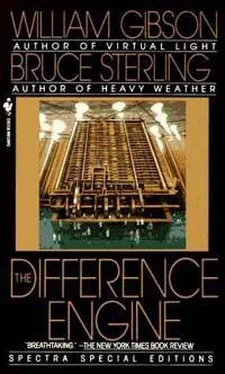William Gibson - The Difference Engine
Здесь есть возможность читать онлайн «William Gibson - The Difference Engine» весь текст электронной книги совершенно бесплатно (целиком полную версию без сокращений). В некоторых случаях можно слушать аудио, скачать через торрент в формате fb2 и присутствует краткое содержание. Жанр: sf_cyber_punk, fantasy_alt_hist, на английском языке. Описание произведения, (предисловие) а так же отзывы посетителей доступны на портале библиотеки ЛибКат.
- Название:The Difference Engine
- Автор:
- Жанр:
- Год:неизвестен
- ISBN:нет данных
- Рейтинг книги:3 / 5. Голосов: 1
-
Избранное:Добавить в избранное
- Отзывы:
-
Ваша оценка:
- 60
- 1
- 2
- 3
- 4
- 5
The Difference Engine: краткое содержание, описание и аннотация
Предлагаем к чтению аннотацию, описание, краткое содержание или предисловие (зависит от того, что написал сам автор книги «The Difference Engine»). Если вы не нашли необходимую информацию о книге — напишите в комментариях, мы постараемся отыскать её.
The Difference Engine — читать онлайн бесплатно полную книгу (весь текст) целиком
Ниже представлен текст книги, разбитый по страницам. Система сохранения места последней прочитанной страницы, позволяет с удобством читать онлайн бесплатно книгу «The Difference Engine», без необходимости каждый раз заново искать на чём Вы остановились. Поставьте закладку, и сможете в любой момент перейти на страницу, на которой закончили чтение.
Интервал:
Закладка:
Oliphant sat alone in a small waiting-room, which communicated by a glazed door with a surgery. The buff-colored walls were hung with colored diagrams depicting the ravages of hideous diseases. A bookcase was crammed with dingy medical volumes. There were carved wooden pews that might have come from a wrecked church, and a coal-dyed woolen drugget in the middle of the floor.
He looked at a mahogany instrument-case and a huge roll of lint occupying places of their own on the bookcase.
Someone called his name.
He saw a face through the panes of the surgery door. Pallid, the bulging forehead plastered with drenched strands of dark hair.
"Collins," he said. " 'Captain Swing.' " And other faces, legion, the faces of the vanished, names suppressed from memory.
"Mr. Oliphant?"
Dr. McNeile regarded him from the doorway. Vaguely embarrassed, Oliphant rose from his pew, automatically straightening his coat.
"Are you entirely well, Mr. Oliphant? Your expression was most extraordinary, just then." McNeile was slender and neatly bearded, with dark brown hair, his grey eyes so pale as to suggest transparency.
"Yes, thank you, Dr. McNeile. And yourself?"
"Very well, thank you. Some remarkable symptoms are emerging, Mr. Oliphant, in the wake of recent events. I've one gentleman who was seated atop an omnibus, Regent Street, when that vehicle was struck broadside by a steam-gurney traveling at an estimated twenty miles per hour!"
"Really? How dreadful…"
To Oliphant's horror, McNeile actually rubbed his long white hands together. "There was no evident physical trauma as a result of the collision. None. None whatever." He fixed Oliphant with that bright, nearly colorless gaze. "Subsequently, we have observed insomnia, incipient melancholia, minor amnesiac episodes—numerous symptoms customarily associated with latent hysteria." McNeile smiled, a quick rictus of triumph. "We have observed, Mr. Oliphant, a remarkably pure, that is to say, a clinical progression of railway spine!"
McNeile bowed Oliphant through the doorway, into a handsomely paneled room, which was sparsely furnished with ominous electro-magnetic appliances. Oliphant removed his coat and waistcoat, arranging them upon a mahogany valet-stand.
"And your… 'spells,' Mr. Oliphant?"
"None, thank you, since the last treatment." Was this true? It was difficult to say, really.
"And your sleep has been undisturbed?"
"I should say so. Yes."
"Any dreams of note? Waking visions?"
"No."
McNeile stared with his pale eyes. "Very well."
Oliphant, feeling utterly foolish in his braces and starched shirt-front, climbed upon McNeile's "manipulation table," a curiously articulated piece of furniture that in equal parts resembled a chaise-lounge and a torturer's rack. The thing's various segments were upholstered in a stiff. Engine-patterned brocade, smooth and cold to the touch. Oliphant attempted to find a comfortable position; McNeile made this impossible, spinning one or another of several brass wheels. "Do be still," McNeile said.
Oliphant closed his eyes. "This fellow Pocklington," McNeile said.
"I beg your pardon?" Oliphant opened his eyes. McNeile stood above him, positioning a coil of iron on an adjustable armature.
"Pocklington. He's attempting to take credit for the cessation of the Limehouse cholera."
"The name isn't familiar A medical man?"
"Hardly. The fellow's a works-engineer. He claims to have ended the cholera by the simple expedient of removing the handle from a municipal water-pump!" McNeile was screwing a braided copper cable in place.
"I'm afraid I don't follow you."
"Little wonder, sir! The man's either a fool or the worst sort of charlatan. He's written in the Times that the cholera is nothing more than the result of contaminated water."
"Is that entirely unreasonable, do you think?"
"Utterly counter to enlightened medical theory." McNeile set to work with a second length of copper. "This Pocklington, you see, is something of a favorite of Lord Babbage's. He was employed to remedy the ventilation troubles of the pneumatic trains."
Oliphant, detecting the envy in McNeile's tone, felt a slight and spiteful satisfaction. Babbage, speaking at Byron's state funeral, had regretted the fact that modern medicine remained more an art than a science. The speech, naturally, had been most widely published.
"Do close your eyes, please, in the event of a spark being discharged." McNeile was pulling on a pair of great, stiff, leather gauntlets.
McNeile connected the copper cables to a massive voltaic cell. The room filled with the faint eerie odor of electricity.
"Please try to relax, Mr. Oliphant, so as to facilitate the polar reversal!"
Half-Moon Street was illuminated by a massive Webb lamp, a fluted Corinthian column fueled by sewer-gas. Like the rest of London's Webbs, it had remained unlit, during the summer's emergency, for fear of leaks and explosions. Indeed, there had been at least a dozen pavement-ripping blasts, most attributed to the same firedamp that powered the Webb. Lord Babbage was an outspoken supporter of the Webb method; as a result, every school-boy knew that the methane potential from a single cow was adequate for an average household's daily heating, lighting, and cooking requirements.
He glanced up at the lamp as he neared his own Georgian facade. Its light was another apparent token of returning normalcy, but he took little comfort in tokens. The physical and more crudely social cataclysm was past now, certainly, but Byron's death had triggered successive waves of instability; Oliphant imagined them spreading out like ripples in a pond, overlapping with others that spread from more obscure points of impact, creating ominously unpredictable areas of turbulence. One such, certainly, was the business of Charles Egremont and the current Luddite witch-hunt.
Oliphant knew with absolute professional certainty that the Luddites were defunct; despite the best efforts of a few manic anarchists, the London riots of the past summer had shown no coherent or organized political agenda. All reasonable aspirations of the working-class had been successfully subsumed by the Radicals. Byron, in his vigorous days, had tempered justice with a well-dramatized show of mercy. Those early Luddite leaders who had made their peace with the Rads were now the tidy, comfortably well-to-do leaders of respectable trades-unions and craft-guilds. Some were wealthy industrialists—though their peace of mind was severely perturbed by Egremont's systematic disinterment of old convictions.
A second wave of Luddism had arisen in the turbulent forties, aimed, this time, directly against the Rads, with a charter of popular rights and a desperate zest for violence. But it had crumbled in a welter of internecine treachery, and its boldest spirits, such as Walter Gerard, had met a distressingly public punishment. Today, such groups as the Manchester Hell-Cats, to which Michael Radley had belonged as a boy, were mere youth-gangs, quite devoid of political purpose. Captain Swing's influence might still be felt occasionally in rural Ireland, or even in Scotland, but Oliphant attributed this to the Rads' agricultural policies, which tended to lag behind their brilliance in industrial management.
No, he thought, as Bligh opened the door at his approach, the spirit of Ned Ludd was scarcely abroad in the land, but what was one to make of Egremont and his furious campaign?
"Good evening, sir."
"Good evening, Bligh." He gave Bligh his top-hat and umbrella.
"Cook has a cold joint, sir."
"Very good. I'll dine in the study, thank you."
"Feeling well, sir?"
"Yes, thank you." Either McNeile's magnets or the devilishly uncomfortable manipulation table had set his back aching. McNeile had been recommended to him by Lady Brunel, Lord Brunel's spine being assumed to have suffered an inordinate amount of railway-shock in the course of his famous career. Dr. McNeile had recently diagnosed Oliphant's "numinous spells," as he insisted on calling them, as symptoms of railway-spine, a condition in which the magnetic polarity of the patient's vertebrae was assumed to have been reversed by trauma. It was McNeile's thesis that this condition might be corrected by the application of electromagnetism, and to this end Oliphant now paid weekly visits to the Scot's Harley Street premises. McNeile's manipulations reminded Oliphant of his own father's unhealthily keen interest in mesmerism.
Читать дальшеИнтервал:
Закладка:
Похожие книги на «The Difference Engine»
Представляем Вашему вниманию похожие книги на «The Difference Engine» списком для выбора. Мы отобрали схожую по названию и смыслу литературу в надежде предоставить читателям больше вариантов отыскать новые, интересные, ещё непрочитанные произведения.
Обсуждение, отзывы о книге «The Difference Engine» и просто собственные мнения читателей. Оставьте ваши комментарии, напишите, что Вы думаете о произведении, его смысле или главных героях. Укажите что конкретно понравилось, а что нет, и почему Вы так считаете.









